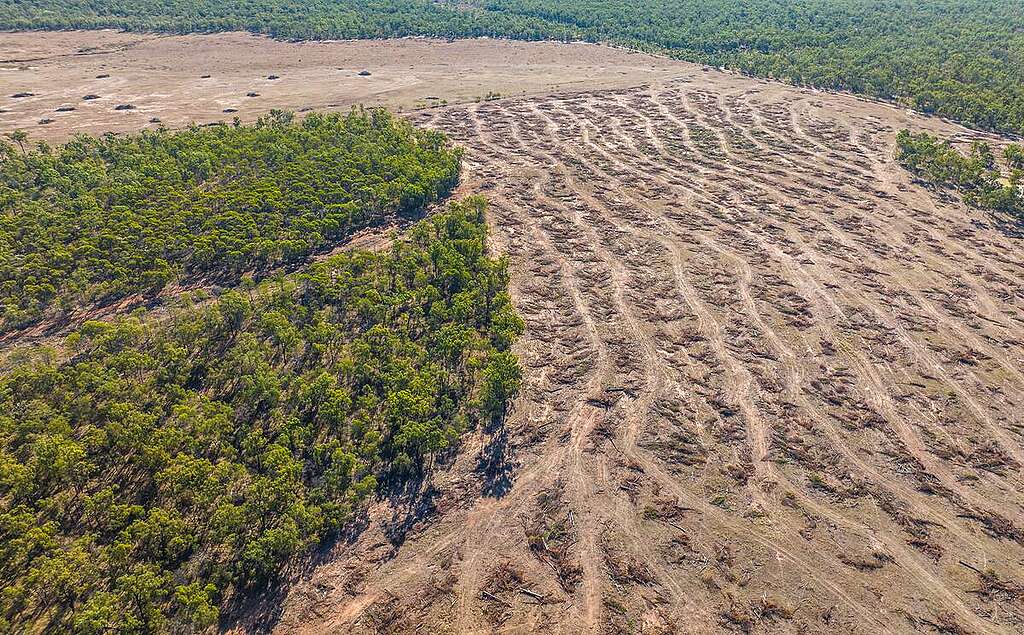A joint investigation by three of Australia’s leading environmental organisations has uncovered multiple instances of large-scale deforestation which were not referred to the federal government for approval.

Since December 2023, The Wilderness Society, Greenpeace Australia Pacific and Queensland Conservation Council have referred six instances of potentially illegal deforestation to the federal government for assessment. In each case, habitat for listed threatened and endangered species, including the koala, northern quoll and greater glider, was bulldozed with no assessments undertaken, and no approvals granted.
The investigation exposes alarming loopholes in Australia’s national environment law, the Environmental Protection and Biodiversity Conservation Act (EPBC), which is currently undergoing a once-in-a-generation reform. The government has released elements of the draft legislation to key stakeholders, including the organisations listed above, but representatives involved in the closed-door sessions have voiced concerns that the reforms outlined so far lack the ambition needed to halt the accelerating decline of nature.
In Australia, an area of bushland and forest the size of the MCG is bulldozed every two minutes, killing and maiming millions of native animals every year. Australia is the world leader in mammal extinctions and a global deforestation hotspot.
Gemma Plesman, Senior Campaigner at Greenpeace Australia Pacific, said that the breaches highlight that Australia’s national environment law is not fit-for-purpose and failing to stop the unregulated destruction of forests and bushland.
“Currently, the EPBC Act does little to address or regulate deforestation. On top of this, the powers that could be used to protect threatened species habitat are very rarely wielded due to the political reluctance to regulate so many bulldozing proposals at a farming property level. This means rampant bulldozing of threatened species habitat is falling through the cracks.
“Australia urgently needs strong, new environmental laws that will halt nature destruction and end the extinction crisis. Greenpeace strongly welcomes the long-overdue overhaul of our broken national nature laws but they need to address the deforestation crisis to succeed.”
Hannah Schuch, Queensland Campaign Manager at The Wilderness Society, said that the Albanese government is letting deforestation go unchecked and any reforms must rein in this environmental crisis.
“As Australia is now globally-recognised as a deforestation hotspot, monitoring the unlawful destruction of forests should not be left to environmental organisations to discover.
“Australians expect the national nature law to actually protect the wildlife that we pride ourselves on, not to allow the ongoing destruction of vital habitat for threatened species. Stronger nature laws will give certainty to nature, communities and business. These changes are within Labor’s reach.”
Natalie Frost, Nature Campaigner, Queensland Conservation Council, said that Queensland is home to more forest and woodland than any other state, and that the Albanese government must properly enforce the current laws to protect these crucial ecosystems.
“Queensland has a world leading vegetation monitoring system, but sadly this investigation shows that nothing is being done to stop the bulldozing of hundreds of thousands of hectares each year, including forests, home to endangered koalas.
“With a federal commitment of ‘no new extinctions’, the first step towards that would be to enforce our current laws to stop the bulldozers and protect threatened species like the Northern Quoll and Star Finch.”
—ENDS—
High res images and footage of deforestation can be found here
For interviews contact Kate O’Callaghan, Greenpeace Australia Pacific on 0406 231 892 or [email protected]